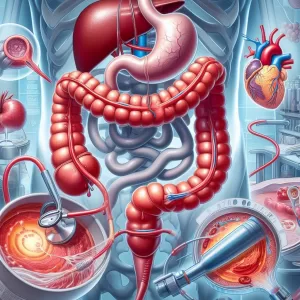Quels sont les facteurs de risque de maladie cardiovasculaire?
[wp_show_posts id=””]
**Question: What are the Risk Factors for Developing Cardiovascular Disease?**
**Answer:**
Cardiovascular disease (CVD) refers to conditions affecting the heart and blood vessels. Various factors contribute to the risk of developing CVD, including:
**Non-Modifiable Risk Factors:**
* **Age:** Advanced age increases the risk of atherosclerosis (hardening of arteries).
* **Family history:** A history of CVD in the family, particularly premature CVD, suggests a genetic predisposition.
* **Race and ethnicity:** Certain ethnic groups, such as African Americans and American Indians, are more likely to develop CVD.
* **Sex:** Men have a higher risk of developing CVD, but women are more likely to die from it.
**Modifiable Risk Factors:**
* **Hypertension (High Blood Pressure):** Uncontrolled high blood pressure is a major risk factor for CVD.
* **High cholesterol:** Elevated levels of low-density lipoprotein (LDL) or “bad” cholesterol contribute to plaque buildup in arteries.
* **Diabetes:** Uncontrolled diabetes can damage blood vessels and increase blood sugar, leading to vessel narrowing.
* **Obesity:** Excess weight increases the risk of developing high blood pressure, diabetes, and high cholesterol.
* **Smoking:** Smoking damages blood vessels and promotes plaque formation.
* **Physical inactivity:** Regular exercise helps lower blood pressure, cholesterol, and improves overall cardiovascular health.
* **Unhealthy diet:** A diet high in saturated fat, trans fat, sodium, and sugar increases the risk of CVD.
* **Excessive alcohol consumption:** Heavy drinking can damage the heart muscle and contribute to high blood pressure.
* **Stress:** Chronic stress can elevate blood pressure and release hormones that can harm the cardiovascular system.
* **Air pollution:** Exposure to air pollutants, such as particulate matter and ozone, has been linked to increased cardiovascular events.
* **Sleep disorders:** Poor sleep, including obstructive sleep apnea, can disrupt hormone regulation and contribute to CVD.
**Warning Signs and Symptoms:**
Symptoms of CVD may include:
* Chest pain or discomfort (angina)
* Shortness of breath or fatigue
* Heart palpitations or irregular heartbeat
* Pain in the arms, neck, back, or jaw
* Weakness or numbness on one side of the body
* Sudden collapse or loss of consciousness
* Swelling in the legs, ankles, or abdomen
If you experience any of these symptoms, seek immediate medical attention. Early detection and treatment can significantly improve the chances of successful management and prevent life-threatening complications of CVD.
**Preventive Measures:**
To reduce your risk of developing cardiovascular disease, focus on:
* Maintaining a healthy blood pressure
* Lowering cholesterol levels
* Managing diabetes
* Achieving and maintaining a healthy weight
* Quitting smoking
* Engaging in regular physical activity
* Eating a nutritious diet
* Limiting alcohol consumption
* Managing stress effectively
* Getting enough sleep
* Protecting yourself from air pollution
* Working with your healthcare provider to identify and address specific risk factors
**Question: What are the Risk Factors for Developing Cardiovascular Disease?**
**Answer:**
Cardiovascular disease (CVD) refers to conditions affecting the heart and blood vessels. Various factors contribute to the risk of developing CVD, including:
**Non-Modifiable Risk Factors:**
* **Age:** Advanced age increases the risk of atherosclerosis (hardening of arteries).
* **Family history:** A history of CVD in the family, particularly premature CVD, suggests a genetic predisposition.
* **Race and ethnicity:** Certain ethnic groups, such as African Americans and American Indians, are more likely to develop CVD.
* **Sex:** Men have a higher risk of developing CVD, but women are more likely to die from it.
**Modifiable Risk Factors:**
* **Hypertension (High Blood Pressure):** Uncontrolled high blood pressure is a major risk factor for CVD.
* **High cholesterol:** Elevated levels of low-density lipoprotein (LDL) or “bad” cholesterol contribute to plaque buildup in arteries.
* **Diabetes:** Uncontrolled diabetes can damage blood vessels and increase blood sugar, leading to vessel narrowing.
* **Obesity:** Excess weight increases the risk of developing high blood pressure, diabetes, and high cholesterol.
* **Smoking:** Smoking damages blood vessels and promotes plaque formation.
* **Physical inactivity:** Regular exercise helps lower blood pressure, cholesterol, and improves overall cardiovascular health.
* **Unhealthy diet:** A diet high in saturated fat, trans fat, sodium, and sugar increases the risk of CVD.
* **Excessive alcohol consumption:** Heavy drinking can damage the heart muscle and contribute to high blood pressure.
* **Stress:** Chronic stress can elevate blood pressure and release hormones that can harm the cardiovascular system.
* **Air pollution:** Exposure to air pollutants, such as particulate matter and ozone, has been linked to increased cardiovascular events.
* **Sleep disorders:** Poor sleep, including obstructive sleep apnea, can disrupt hormone regulation and contribute to CVD.
**Warning Signs and Symptoms:**
Symptoms of CVD may include:
* Chest pain or discomfort (angina)
* Shortness of breath or fatigue
* Heart palpitations or irregular heartbeat
* Pain in the arms, neck, back, or jaw
* Weakness or numbness on one side of the body
* Sudden collapse or loss of consciousness
* Swelling in the legs, ankles, or abdomen
If you experience any of these symptoms, seek immediate medical attention. Early detection and treatment can significantly improve the chances of successful management and prevent life-threatening complications of CVD.
**Preventive Measures:**
To reduce your risk of developing cardiovascular disease, focus on:
* Maintaining a healthy blood pressure
* Lowering cholesterol levels
* Managing diabetes
* Achieving and maintaining a healthy weight
* Quitting smoking
* Engaging in regular physical activity
* Eating a nutritious diet
* Limiting alcohol consumption
* Managing stress effectively
* Getting enough sleep
* Protecting yourself from air pollution
* Working with your healthcare provider to identify and address specific risk factors
Un commentaire
Laisser un commentaire
Articles populaires







Post Title: Cardiovascular Disease Risk Factors